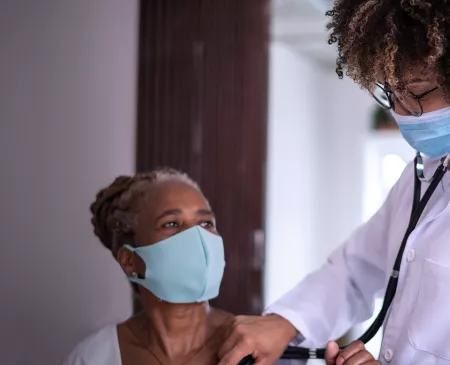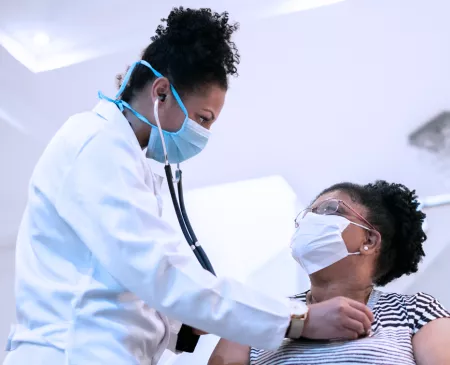BLACK HISTORY MONTH 2022
Focus on Health and Wellness
The Buzz This Week
Background on Black History Month
In 1926, American historian Carter G. Woodson established Black History Week to recognize and celebrate the contributions from people of African descent to the U.S. It was extended to the entire month of February beginning in 1976, each year having a relevant theme. This year the theme is Black Health and Wellness. According to the Association for the Study of African American Life and History, the 2022 theme “acknowledges the legacy of not only Black scholars and medical practitioners in Western medicine, but also other ways of knowing (e.g., birthworkers, doulas, midwives, naturopaths, herbalists, etc.) throughout the African Diaspora. The 2022 theme considers activities, rituals, and initiatives that Black communities have done to be well.”
This year’s theme of Health and Wellness continues to draw attention to the persistent health disparities in the Black communities in the U.S. The pandemic illuminated the depths of many health disparities, as co-morbidities more present in the Black population led to complications with COVID-19 and, per the Centers for Disease Control and Prevention and reported by the Kaiser Family Foundation, a higher death rate among the Black population compared to their share of the population. White people, by comparison, accounted for fewer deaths than their share of the population.
Health disparities among the Black population have been present for decades. For example, Black Americans are generally more at risk for heart disease, diabetes, stroke, some types of cancer, asthma, and HIV/AIDS, and they have a higher death rate than white Americans for those diseases and conditions, per the Office of Minority Health in the U.S. Department of Health and Human Services.
There are many different economic and social factors that drive these health disparities, many of which are tied to structural racism, which, according to Health Affairs Editor-In-Chief Alan Weil’s opening commentary in this month’s issue, “is the reason for large, sustained health inequities in the U.S.” Some examples of factors contributing to racial health disparities are listed below, though it is worth reading through the entire issue of this month’s Health Affairs, as the topic is explored in great detail with new data, analysis, and commentary on the topic.
- A higher proportion of the Black population is covered by Medicaid or uninsured as compared to the white population, which limits access to healthcare services.
- Per The Census Bureau, the median Black household earned 61% for every dollar earned in a median white household, making the cost burden of healthcare far greater for the Black population.
- Per The Century Foundation, “social determinants of health, such as poverty, income inequality, wealth inequality, food insecurity, and the lack of safe, affordable housing have important implications for health risk and the ability to attain health insurance coverage for African Americans.”
- When healthcare can be accessed, stereotypes and stigmas about the Black population continue to permeate the medical community. A recent study published in the Journal of the American Medical Association found that “Across all medical conditions studied, stigmatizing language appeared more frequently in notes written about non-Hispanic Black patients.”
Why It Matters
The Health and Wellness theme of this year’s Black History Month should be embraced by healthcare professionals now and in the future, in an effort to reduce racial health disparities in the U.S. This can include conducting outreach to communities where access to care is limited, offering health and wellness education in Black communities, advocating for and directly supporting social determinants of health such as affordable housing and nutritious food options, and treating Black patients with the same dignity and respect given to white patients. Efforts should also be made to continue the discourse and study around systemic racism that has contributed so strongly to these disparities.
The Association for the Study of African American Life and History calls on the Black community and its supporters to use education and activism to elevate Black health and wellness through a quote from Sister Audre Lorde, Black American writer and civil rights activist: “We are doing more to move forward holistically for the betterment of ourselves, our bodies, our relationships, our communities, and our planet. We are determined to create a platform that shines a light on the multiple facets of Black health and wellness through education and activism. There is much to uncover, amplify, question, and correct.” In addition, the association suggests that “Black communities must look to the past to provide the light for our future, by embracing the rituals, traditions, and healing modalities of our ancestors. These ways of knowing require a decolonization of thought and practice.”
Maintaining positive momentum this month and beyond will require attention, advocacy, investment, and research, all of which can be supported by health professionals and communities across the U.S. The University of Southern California has framed this month in a positive light, adopting the theme of “Celebrating Black Joy: Embracing Health and Vitality.” One professor was quoted as saying, “Black joy is the heartbeat and pulse of our survival, our resiliency, our perseverance, our health and wellbeing. Joy has been our weapon and superpower in the face of injustice and structural racism.”
Related Links
Association for the Study of African American Life and History
2022 Black History Theme Executive Summary—Black Health and Wellness
Health Affairs
February 2022 Issue—Racism & Health
The Commonwealth Fund (Video)
The Divide—Confronting Racism in American Healthcare
Celebrating Black Healthcare Leaders While Acknowledging the Ongoing Lack of Representation in Healthcare Leadership
The Buzz This Week
Black History Month is an opportunity to both educate people on the struggles and adversity Black Americans have faced throughout U.S. history as well as to celebrate and honor the triumphs, successes, and contributions Black Americans have made and are making in our society. With a theme of Health and Wellness for 2022, we acknowledge past and present Black trailblazers and leaders in the healthcare community. This is only a small selection of those that have impacted and continue to drive change and innovation in healthcare.
James McCune Smith, MD (1813 to 1865)
James McCune Smith was the first Black American to receive a medical degree. Despite top credentials, he was denied admission at multiple U.S. medical schools due to prejudicial admissions practices and instead attended the University of Glasgow. He returned to the U.S. to practice and also became the first Black American to own and run a pharmacy as well as to be published in multiple medical journals.
Rebecca Lee Crumpler, MD (1831 to 1895)
Rebecca Lee Crumpler was the first female Black American to receive her medical degree. She first practiced as a nurse for 8 years before being admitted to New England Female Medical College in 1860. At the time, only 0.6% of practicing physicians were women. She focused her practice on the care of women and children, and published work on the importance of preventative care.
Mary Eliza Mahoney, RN (1845 to 1926)
Mary Eliza Mahoney was the first Black American licensed nurse. She was admitted to a very rigorous graduate school nursing program at The New England Hospital for Women and Children and was one of only 4 out of the starting 42 to graduate on time. She spoke out on discrimination often in her career and chose a path as a private nurse due to the bias she faced in public nursing. She went on to co-found the National Association of Colored Graduate Nurses (NACGN) and continued to advocate for equality. She was inducted into the inaugural class of the Nursing Hall of Fame.
Robert Boyd, MD, DDS (1855 to 1912)
Robert Boyd was the president and co-founder of the first professional organization for Black physicians. Boyd graduated with honors from the medical department of Central Tennessee College and later received a dental degree with honors while teaching as an adjunct professor of chemistry at Meharry Medical College. Boyd, with 10 other Black physicians, formed the Society of Colored Physicians and Surgeons, which became the National Medicine Association. Boyd was elected the first president. He was acutely focused on lower life expectancy among Black Americans and used churches and other forums to educate Black Americans on signs, symptoms, and prevention methods for Tuberculosis.
Jane Cooke Wright, MD (1919 to 2013)
Jane Cooke Wright attended New York Medical College and was chief resident at Harlem Hospital. She did groundbreaking cancer research that laid the foundation for treating tumors with chemotherapy. She was the only female founder of the American Society of Clinical Oncology (ASCO), which sets standards for clinical oncology. She was later appointed Associate Dean and Professor of Surgery at New York Medical College, the highest-ranking academic position of any female Black American at the time.
Herbert W. Nickens, MD (1947 to 1999)
Herbert Nickens graduated from the University of Pennsylvania’s medical school in 1973 and became the first director of the Office of Minority Health at the Department of Health and Human Services. He then became the first Vice President for Community and Minority Programs for the Association for American Medical Colleges (AAMC). In his role at the AAMC, he was a tireless advocate for equity and diversity in medical education and was key in developing the AAMC’s Project 2000 by 3000 to increase underrepresented minorities in medical education.
Lonnie Bristow, MD (b. 1930)
Lonnie Bristow attended New York University for his medical degree and went on to practice internal medicine in California. He joined the American Medical Association in 1970, 2 years after the first Black members were accepted, and served in many roles for the more than 300,000 member organization before being elected its first Black president in 1995. His work has focused on sickle cell anemia and socio-economic factors that impact healthcare.
Joycelyn Elders, MS, MD (b. 1933)
Joycelyn Elders attended University of Arkansas Medicine after serving in the U.S. Army. She was the only woman to graduate from the medical school in 1960. She became a faculty member at University of Arkansas School of Medicine in pediatric endocrinology. In 1993 she was appointed as the first Black U.S. Surgeon General. She continues to advocate for Black representation in the medical field.
Kevin Lofton, MHA, FACHE (b. 1954)
Kevin Lofton is an accomplished healthcare executive. He served as CEO of Howard University Hospital and UAB Hospital before becoming CEO of Catholic Health Initiatives (CHI) in 2003. He continued to serve as co-CEO of CommonSpirit, the health system that was formed following a merger of CHI and Dignity Health in 2019. He retired in 2021 but continues to serve on the boards of Gilead Sciences and Rite Aid Corporation. He was named to Modern Healthcare's 100 Most Influential People in Healthcare list 15 times and served as the American Hospital Association’s board chairman in 2007. He is recognized for his work in health disparities and creating healthy communities.
Kenneth Frazier, JD (b. 1954)
Kenneth Frazier received his Juris Doctorate from Harvard Law School in 1978 and following graduation worked as a partner at Drinker, Biddle, & Reath, where Merck was one of his clients. He joined the company in 1992 and in 2011 was appointed chairman and CEO, the first Black American CEO of a major pharmaceutical company. He served in the role for 10 years before stepping down to serve as executive chairman of the board. At the time of his retirement in 2021, he was 1 of only 4 Black CEOs at the helm of a Fortune 500. In addition to his role at Merck, he co-founded OneTen, which seeks to develop and place 1 million Black Americans over 10 years into high-paying employment positions.
KMarie King, MD, MS, MBA
KMarie King in an Army veteran who attended Washington University School of Medicine and completed a general surgery residency at University of Pittsburgh and a Hepato-pancreato-biliary Surgery fellowship at Mayo Clinic. She was the medical director for Grady Memorial Hospital, a nearly 1,000 bed hospital and trauma center in Atlanta. She became the first Black female chair of surgery at an academic health center in the U.S. in 2021 at Albany Medical College. She is an accomplished researcher with over 100 peer-reviewed papers and publications.
Kizzmekia Corbett, MS, PhD (b. 1986)
Kizzmekia Corbett has a PhD in Microbiology and Immunology from the University of North Carolina at Chapel Hill and has been an Assistant Professor of Immunology and Infectious Diseases at Harvard T.H. Chan School of Public Health since 2021. Corbett was the scientific lead for the National Institute of Health’s (NIH) coronavirus team, and her research and work led to the development of the Moderna vaccine, which has since saved millions of lives. Corbett is also active in educating people of color about vaccine science and safety.
Why It Matters
A common theme among past and present Black healthcare leaders, in addition to their substantial professional achievements, is a commitment to improving Black representation among future healthcare leaders and executives. Despite the fact that over 13% of the U.S. population responded as Black on the last census report, only 5% of physicians and 6% of RNs identify as Black. Among medical school faculty, the disparities are worse—with only 4% of all faculty and department chairs reporting as Black. A 2021 report from The Chartis Group and The National Association of Health Services Executives (NAHSE) found the underrepresentation also extends to the C-suite of hospitals and health systems. Out of the U.S. News and World Report Honor Roll, 100 great hospitals, less than 10% of C-suite executives were Black, and only 46% of hospitals had at least one Black C-suite officer. Even graphics in textbooks disproportionately show lighter skin, with only 4.5% of images showing dark skin tones.
Addressing underrepresentation of Black Americans in our physicians, nurses, and hospital executive leadership will require a multi-dimensional, deliberate, and long-term effort. Solutions will likely include creating safe spaces to call out bias and discrimination, starting or growing affinity groups so Black colleagues can identify resources and colleagues or mentors with similar experiences, and developing support structures, including allies, accomplices, mentors/coaches, and sponsors that include both Black and non-Black participants advocating for the advancement of Black colleagues. As we celebrate Black History Month and the incredible accomplishments of the past and present leaders listed above, and so many more, let us also consider how we address underrepresentation in healthcare so that our future leaders more fully represent our population.
Related Links
Modern Healthcare
TOP DIVERSITY LEADERS IN HEALTHCARE—2021
GoodRx Health
Celebrating 16 Black Leaders Who Have Shaped Our Healthcare Industry
AMA
Inequities in Medicine Take Personal Toll on Physicians, Students







